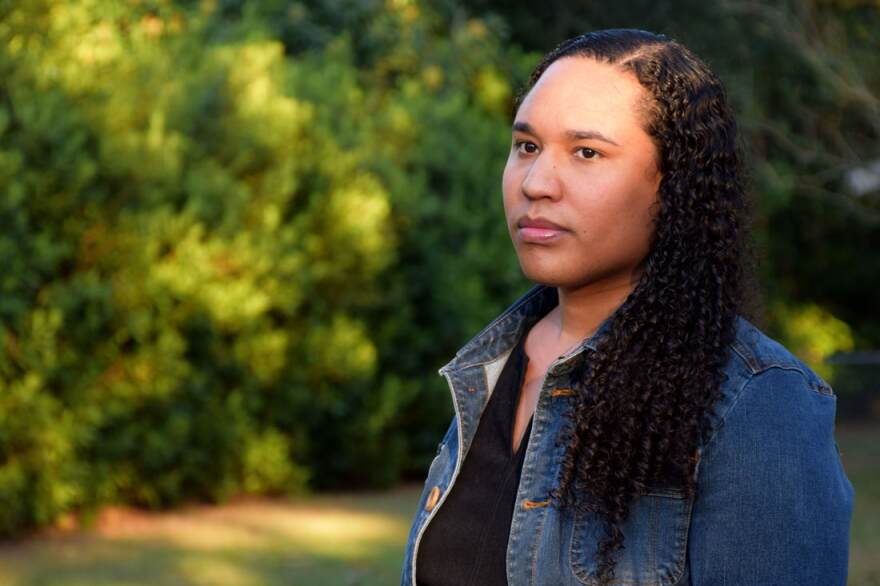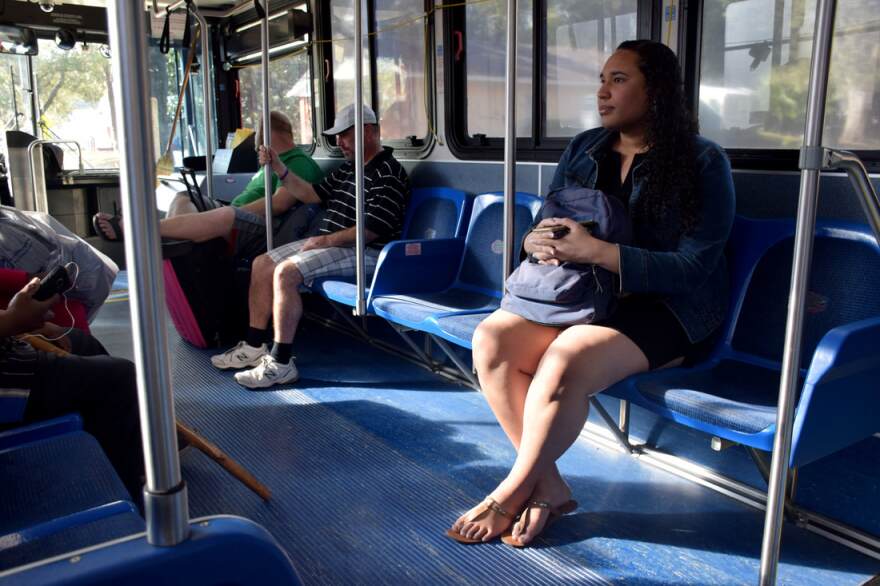Ellie Gaustria’s identity lies at what she calls a deadly intersection.
As a transgender, black and indigenous woman, she feels as if she constantly stands in the crossfire of racism and transphobia. Last year was named the deadliest year in American history for transgender women, particularly women of color.
Every year on Transgender Day of Remembrance — generally in late November — people around the world mourn the losses of transgender people murdered as a result of anti-trans violence. Born and raised in Gainesville, Gaustria says she lives every day wondering if hers will be the next name read somberly from that list.
What's it like being a queer person of color?
It can be frustrating. Being a transgender person in Gainesville, I can say it's been a pretty decent experience compared to living in a smaller town. If you go a few miles outside of Gainesville it's like another world. But it can be a little difficult because a lot of organizations here in Gainesville – or in general – kind of cater to queer people that are white and not necessarily to people of color. So we're usually at a deadly intersection of being a person of color and also being LGBTQ+. We have no representation. We're targeted toward violence. We have some of the highest rates of homelessness, unemployment, and health care disparities. I feel there's kind of this gap of understanding of our communities, and we live two different worlds. So like me, as a queer person of color living in Gainesville, it's a lot different than maybe someone who is white and LGBTQ+. There's different struggles. There's different hardships that we experience.
What kinds of struggles have you faced?
I've had people yell slurs at me walking down the street. And I've had people literally follow me walking home. That was a really scary situation. But I've experienced some transmisogyny, specifically. At my very first job, I was 18 years old and I worked on campus at Santa Fe in the bookstore. I transitioned while I was working there, and I worked there for like three months.
So I never really faced transphobia to my face; it was behind my back. Things like the supervisors making fun of me and calling me a tranny and those type of derogatory words toward our community. It was like my nickname. Then they would cut my hours out of nowhere. I usually worked a good set of hours, like 20 hours, and then they started cutting it to 10 hours, and then they started cutting that to five hours a week. So essentially it was like they were trying to make me quit. They didn't want to fire me.
It's like the scene in Mean Girls where Cady is coming into a room and she's like, "You can tell everyone's been talking about you." It was like that coming into work everyday. There was a silence. The supervisors were actually quite mean to me. It was just all the little things kind of building up.
Then they actually fired me. And how they did it was really creative. They told me something like I was the last person to get hired, so with budget cuts I had to be the first to go. But when I looked at the handbook — like the one that they give you when you first start working there — I looked at the hiring/firing process, and it's actually not how they do it. So it's like they illegally fired me without me really knowing.
Between starting your transition and being discriminated against in the workplace, all at 18 years old, how did all of that make you feel?
I came out as being trans when I was like 11 or 12 years old. That's actually really rare to see people coming out as trans so young. But my mom was really scared about my safety, you know, so she didn't want me to transition. She said, “You have to wait until you graduate high school.” So essentially when I turned 18, I was working toward transitioning. My mom was buying me more affirming clothing, buying me makeup. My desire was to start college as Ellie, with she/her pronouns, all women's clothing, and to assert myself into the world as I knew myself to be: as a woman.
So at my first job that was kind of scary. Looking back, I didn't realize the type of discrimination I was experiencing or the type of transmisogyny I was experiencing until many years later.
But then right after I left that job I got the job that I have now, and my supervisors are super affirming and amazing and supportive. So I feel really lucky. I feel like that first job is a bad experience, but it could have been a lot worse. I kind of grew from that experience. So when I came into the new job, it was like a fresh start.
So you've said there can be discrimination against queer people of color within the LGBTQ+ community. Can you expand on that?
So with major organizations like GLAAD or the Human Rights Campaign or GLSEN, they really kind of cater toward white LGBTQ+ people. People of color are really left out of that. White trans people are not as marginalized as people of color. White trans people are not the ones that have the greatest disparities in health care, housing, homelessness, education, resources. It's us, trans women of color.
White LGBTQ+ people have left behind the founders of our movement, who were trans women of color. Marsha "Pay It No Mind" Johnson and Sylvia Rivera, two trans women of color – Marcia being a black woman and Sylvia being a Latina woman – in New York City, created an organization that helped fight against homelessness of LGBTQ+ people. They were there at the forefront of the Stonewall Riots. These women threw the first brick, or threw the first shot glass. It is because of those two women that we have Pride parades and we have Pride events all over the world. But there's this whitewashing when we're talking about activism, where white LGBTQ+ people have a lot more resources, a lot more connections, are more likely to be famous, or to be interviewed for a magazine, or have representation. Whereas trans people of color, we're kind of really left behind in that.
What do you want people to know most about you and your communities?
Specifically about queer transgender people of color (QTPOC), I want people to know we exist. We deserve love. We deserve recognition. We deserve respect. To the white people in our community who are LGBTQ+, I would like to tell them to take a seat. One thing they like to do is snatch the microphone from us so we can't speak for ourselves. So, let us speak for ourselves, let us advocate for our own community. Support us in our advocacy. And be better allies.There's so much erasure that goes on when it comes to giving us visibility and allowing for us to speak for ourselves. So I'd say, listen to us. We’ve got a lot to teach you, but don't expect us to teach you anything. It's not our job to play teachers. You can Google some cool things.
Help uplift our community. Don't stand in front of us, stand with us.
<i>Find more <a href="https://www.wuft.org/news/topics/florida-voices/" target="_blank" link-data="{"link":{"attributes":[],"linkText":"Florida Voices","target":"NEW","url":"https://www.wuft.org/news/topics/florida-voices/","_id":"0000018c-db0d-d1db-a38c-fb5dee3f0000","_type":"ff658216-e70f-39d0-b660-bdfe57a5599a"},"_id":"0000018c-db0d-d1db-a38c-fb5dee3f0001","_type":"809caec9-30e2-3666-8b71-b32ddbffc288"}">Florida Voices</a> in our weekly podcast, <a href="http://wuft.org/thepoint" target="_blank" link-data="{"link":{"attributes":[],"linkText":"The Point","target":"NEW","url":"http://wuft.org/thepoint","_id":"0000018c-db0d-d1db-a38c-fb5dee3f0002","_type":"ff658216-e70f-39d0-b660-bdfe57a5599a"},"_id":"0000018c-db0d-d1db-a38c-fb5dee3f0003","_type":"809caec9-30e2-3666-8b71-b32ddbffc288"}">The Point</a>. Do you know someone whose story should be told? <a href="mailto:news@wuft.org" target="_blank" link-data="{"link":{"attributes":[],"linkText":"Email news@wuft.org","target":"NEW","url":"mailto:news@wuft.org","_id":"0000018c-db0d-d1db-a38c-fb5dee3f0004","_type":"ff658216-e70f-39d0-b660-bdfe57a5599a"},"_id":"0000018c-db0d-d1db-a38c-fb5dee3f0005","_type":"809caec9-30e2-3666-8b71-b32ddbffc288"}">Email news@wuft.org</a>.</i>









